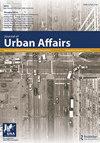Neo-liberalizing social service provision: Reactions and responses to the limits and constraints of housing and settlement services for refugees in Toronto, Canada
IF 1.9
3区 经济学
Q2 URBAN STUDIES
引用次数: 0
Abstract
ABSTRACTThis article engages with the impacts of neoliberalism on the experiences of social service providers working with refugees searching for shelter and affordable housing in Toronto, Canada. The 1990s in Toronto consisted of intergovernmental restructuring, which downloaded federal housing responsibilities onto provincial and municipal governments. Additionally, changes made to settlement funding had direct impacts on non-profit organizations serving immigrants and refugees. This devolution and decentralization of Canada's housing and settlement services have led to a complex hybrid of informal and formal social networks. Based on semi-structured interviews with service providers, this study reveals institutional gaps in Toronto's housing and settlement support models. This paper enriches scholarly debates on (1) neoliberal cities, (2) social service provision for immigrants and refugees, and (3) informal social networks, by engaging with critical feminist frameworks that highlight the importance of a profound understanding of the types of informal networks developed by social service providers.KEYWORDS: Social networksaffordable housingnon-profits AcknowledgmentsFirst, I am deeply appreciative of the social service providers who were interviewed for this project. Thank you very much for sharing your experiences and knowledge on the critical challenges impacting refugees in Canada. This paper could not have been written without your key insights and openness to share your knowledge with me. A very special thank you to my postdoctoral supervisor, Dr. Marieme Lo, who read several drafts of this paper and guided me throughout the process. Her encouragement, support, and wisdom were integral to completing this project. I would also like to recognize my PhD supervisor, Dr. Rachel Silvey, and my doctoral committee for providing guidance and support throughout the dissertation process. Lastly, thank you to all my family and friends, including Thom, Sumaya, Killian, Ashley, and many others, who were always ready to read drafts of this paper. Your conversations, edits, and support have not gone unnoticed.Disclosure statementNo potential conflict of interest was reported by the author(s).Notes1. Although all frontline staff interviewed for this study are employed within nonprofit organizations, the. organizations may be receiving public funding to carry out their services. There is a blurring of lines between clear local state actors and nonprofit employees, because programs and services are dependent on particular funding, which is a mix of public and private funds. Frontline staff working within non- profit organizations is the language used for this article.2. Given the scope and geographical framing of this study, the literature examined focuses mainly on the. Ontario context. Though there are some studies, which offer a comparative analysis of settlement programming in Canada (McGrath & McGrath, Citation2013), this paper highlights the role of neoliberal restructuring on housing and settlement services in Ontario.3. Some of the service provider organizations that participated in this research project have other locations in the Greater Toronto Area (GTA). However, all research participants worked mainly in their primary offices in the City of Toronto, which also includes Scarborough and Etobicoke, and spoke to those experiences.4. Recent reports generated by service provider organizations and coalitions have collected data on the impacts of COVID-19 on service delivery, this article focuses on pre-pandemic challenges, which continue to exist and are heightened within the context of COVID-19.5. Given the limitation of private spaces within the office, only three of the interviews were audio-recorded. Each recording was manually transcribed. The principal investigator conducted detailed fieldnotes for the remaining interviews. Each interview was analyzed manually using deductive coding.6. Though housing and settlement supports are central to this study, frontline workers often adopt multiple roles and provide wrap-around services or referrals to other social services, including health, education, and employment.Additional informationNotes on contributorsMary-Kay BachourMary-Kay Bachour is a post-doctoral researcher at the Women and Gender Studies Institute, based at the University of Toronto, where she explores the housing challenges faced by refugee women in the city of Toronto, Canada. Following her Master’s degree at the Women and Gender Studies Institute, Dr. Bachour completed her PhD at the University of Toronto in the Department of Geography and Planning. Her doctoral research delved into the critical realm of social service provision and housing for government-assisted refugees within Toronto. Dr. Bachour also teaches an array of courses at the University of Guelph-Humber in Toronto, Ontario.新自由主义社会服务提供:对加拿大多伦多难民住房和定居服务的限制和约束的反应和回应
摘要本文探讨新自由主义对社会服务提供者在加拿大多伦多帮助寻找住所和经济适用房的难民的影响。20世纪90年代,多伦多进行了政府间重组,将联邦住房责任下放给了各省和市政府。此外,安置资金的变化对服务移民和难民的非营利组织产生了直接影响。加拿大住房和定居服务的这种权力下放和权力下放导致了非正式和正式社会网络的复杂混合。基于对服务提供者的半结构化访谈,本研究揭示了多伦多住房和定居支持模式的制度差距。本文丰富了关于(1)新自由主义城市,(2)为移民和难民提供社会服务,以及(3)非正式社会网络的学术辩论,通过参与关键的女权主义框架,强调深刻理解社会服务提供者开发的非正式网络类型的重要性。关键词:社会网络经济适用房非营利组织致谢首先,我非常感谢为这个项目接受采访的社会服务提供者。非常感谢您就影响加拿大难民的重大挑战分享您的经验和知识。如果没有您的关键见解和与我分享您的知识的开放性,这篇论文就不可能完成。特别感谢我的博士后导师Marieme Lo博士,她阅读了本文的几份草稿,并在整个过程中指导了我。她的鼓励、支持和智慧是完成这个项目不可或缺的。我还要感谢我的博士导师Rachel Silvey博士和我的博士委员会在整个论文过程中提供的指导和支持。最后,感谢我所有的家人和朋友,包括Thom, Sumaya, Killian, Ashley和其他许多人,他们总是准备好阅读这篇论文的草稿。你们的对话、编辑和支持并没有被忽视。披露声明作者未报告潜在的利益冲突。虽然所有接受调查的一线工作人员都受雇于非营利组织,但他们的研究结果显示,组织可能正在接受公共资金来开展服务。明确的地方政府行为者和非营利组织雇员之间的界限变得模糊,因为项目和服务依赖于特定的资金,这些资金是公共和私人资金的混合体。这篇文章使用的语言是在非营利机构工作的一线员工。鉴于本研究的范围和地理框架,研究的文献主要集中在。安大略省上下文。虽然有一些研究对加拿大的定居规划进行了比较分析(McGrath & McGrath, Citation2013),但本文强调了新自由主义重组对安大略省住房和定居服务的作用。参与本研究项目的一些服务提供商组织在大多伦多地区(GTA)设有其他地点。然而,所有的研究参与者主要在多伦多市的主要办公室工作,包括斯卡伯勒和怡陶碧谷,并谈到了这些经历。服务提供商组织和联盟最近编写的报告收集了有关COVID-19对服务提供影响的数据,本文侧重于大流行前的挑战,这些挑战仍然存在,在COVID-19.5的背景下更加突出。由于办公室的私人空间有限,只有三次采访是录音的。每段录音都是手工转录的。首席研究员对剩余的访谈进行了详细的现场记录。使用演绎编码对每个访谈进行人工分析。虽然住房和安置支持是本研究的核心,但一线工作人员往往扮演多重角色,提供一揽子服务或转介到其他社会服务,包括健康、教育和就业。mary - kay Bachour是多伦多大学妇女与性别研究所的博士后研究员,在那里她研究了加拿大多伦多市难民妇女面临的住房挑战。在妇女与性别研究所获得硕士学位后,巴库尔博士在多伦多大学地理与规划系完成了博士学位。她的博士研究深入到社会服务提供和住房的关键领域,政府援助的难民在多伦多。巴库尔博士还在安大略省多伦多的圭尔夫-亨伯大学教授一系列课程。
本文章由计算机程序翻译,如有差异,请以英文原文为准。
求助全文
约1分钟内获得全文
求助全文
来源期刊

Journal of Urban Affairs
URBAN STUDIES-
CiteScore
5.40
自引率
4.80%
发文量
156
期刊介绍:
Focusing on urban research and policy analysis, the Journal of Urban Affairs is among the most widely cited journals in the field. Published for the Urban Affairs Association, the journal offers multidisciplinary perspectives and explores issues of relevance to both scholars and practitioners, including: - Theoretical, conceptual, or methodological approaches to metropolitan and community problems - Empirical research that advances the understanding of society - Strategies for social change in the urban milieu - Innovative urban policies and programs - Issues of current interest to those who work in the field and those who study the urban and regional environment
 求助内容:
求助内容: 应助结果提醒方式:
应助结果提醒方式:


